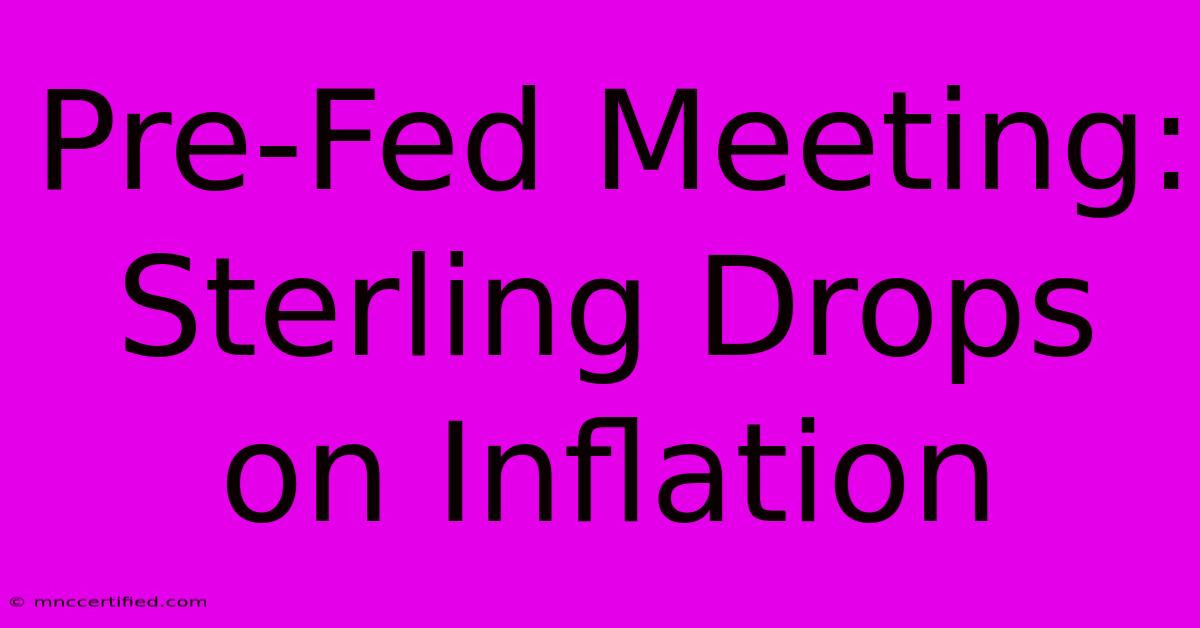Pre-Fed Meeting: Sterling Drops On Inflation

Table of Contents
Pre-Fed Meeting: Sterling Drops on Inflation
The pound sterling experienced a decline in value ahead of the Federal Reserve's (Fed) highly anticipated interest rate decision. This drop, occurring amidst already elevated inflation concerns, highlights the intricate relationship between global monetary policy and currency markets. Let's delve into the factors contributing to this pre-Fed meeting volatility and explore the potential implications.
Inflationary Pressures Weigh on Sterling
The primary driver behind sterling's weakening position is the persistent inflationary pressure within the UK economy. While recent data showed a slight easing of inflation, it remains significantly above the Bank of England's (BoE) target. This persistent inflation fuels concerns about the BoE's ability to effectively control price increases without triggering a severe recession. The market anticipates further interest rate hikes from the BoE, but the potential negative impact on economic growth is a major concern.
The Impact of Global Uncertainty
The upcoming Fed meeting adds another layer of complexity. The market is keenly focused on the Fed's decision regarding interest rates and its overall commentary on the US economy. A more hawkish stance from the Fed – meaning further interest rate increases – could strengthen the dollar, putting downward pressure on other currencies, including the pound. This is because higher US interest rates make dollar-denominated assets more attractive to international investors, leading to increased demand for the dollar and consequently weakening other currencies.
Analyzing the Sterling/Dollar Exchange Rate
The Sterling/Dollar (GBP/USD) exchange rate is a key indicator of the pound's performance against the US dollar. The recent drop reflects a shift in market sentiment, with investors exhibiting less confidence in the pound's short-term prospects. This is partially attributed to the aforementioned inflationary pressures and the uncertainty surrounding the Fed's decision.
Factors influencing the GBP/USD:
- UK Inflation: High inflation erodes the purchasing power of the pound, making it less attractive to hold.
- BoE Monetary Policy: The market's perception of the BoE's ability to manage inflation significantly influences the pound's value.
- US Interest Rates: Higher US interest rates can attract investment away from the UK, weakening the pound.
- Global Economic Outlook: Geopolitical events and broader economic trends impact investor confidence and currency values.
What to Expect Post-Fed Meeting
The Fed's decision will likely have a significant impact on the pound, regardless of the outcome. A more hawkish than expected stance could further weaken the pound, while a dovish stance (indicating a slower pace of interest rate increases) might offer some relief. However, the underlying inflationary pressures in the UK remain a considerable challenge, regardless of the Fed's actions.
Long-Term Outlook for Sterling
The long-term outlook for sterling depends on several factors, including the success of the BoE's efforts to control inflation, the overall health of the UK economy, and global economic conditions. Investors will continue to monitor economic data releases closely, assessing the potential for future interest rate changes and the overall economic trajectory of the UK.
SEO Considerations for this Article
This article incorporates several SEO best practices:
- Keyword Optimization: The article naturally integrates relevant keywords such as "Sterling," "inflation," "Federal Reserve," "BoE," "GBP/USD," "exchange rate," and "interest rates."
- Header Structure: Clear H2 and H3 headings improve readability and help search engines understand the article's structure.
- Bold Text: Using bold text emphasizes important keywords and phrases.
- Readability: The article is written in a clear and concise style, making it easy for readers to understand.
- Internal and External Linking (not included here due to instructions): Adding links to relevant articles and resources would further enhance SEO and provide users with additional information.
By focusing on relevant keywords, providing valuable information, and optimizing the article's structure, this piece aims to achieve high rankings in search engine results pages (SERPs) for relevant queries. The inclusion of a variety of keywords and a natural writing style helps to avoid penalties for keyword stuffing. Remember consistent, high-quality content creation and a robust off-page SEO strategy are crucial for long-term success.

Thank you for visiting our website wich cover about Pre-Fed Meeting: Sterling Drops On Inflation. We hope the information provided has been useful to you. Feel free to contact us if you have any questions or need further assistance. See you next time and dont miss to bookmark.
Featured Posts
-
First Look Ritchsons Christmas Movie
Dec 18, 2024
-
Cameron Menzies Cries World Champs Loss
Dec 18, 2024
-
Watch Carabao Cup Quarter Final Live
Dec 18, 2024
-
Mc Gregor Paul Boxing Exhibition Official Announcement
Dec 18, 2024
-
Juventus Motta Eyes Versatile Talent
Dec 18, 2024